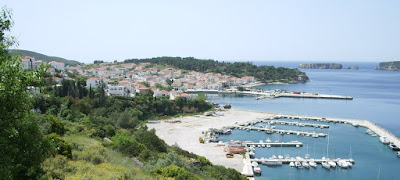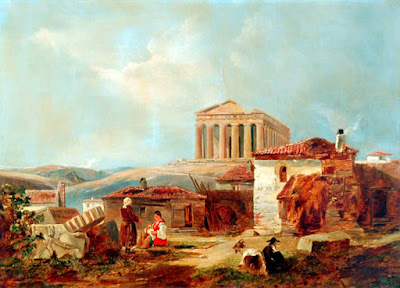 |
| Pylos from the north source Wikipedia |
History of the Peloponnesian War
Book IV: Demosthenes continues his strategies to Athens’ benefit. There is an ironic battle between Athen and Sparta in Pylos, where Athens is fighting on Spartan land, defending it against the Spartans who are approaching by sea. A power struggle between Creon and Nicias ensues and Creon is forced to take command of the troops against his will, after clever manipulation by Nicias, and chooses Demosthenes as his commanding officer. The Spartans are eventually defeated with the prisoners being taken to Athens. The Spartans try to negotiate peace but the Athenians reject the proposal, always “grasping at more.” Nicias now leads an expedition and more Athenian battles ensue.
 |
| Athens with the Acropolis William James Müller source ArtUK |
More battles are described covering many areas of Peloponnese and Attica. Athens appears most of the time to have the upper hand until Brasidas, a Spartan commander, begins a march through Thessaly toward Macedon where he has been invited by its leader, Perdiccas, to help them, and surrounding areas revolt from Athens. Brasidas is wildly successful and is only stopped from invading Eion by Thucydides (our famous author!), however most other Chalcidice territory falls into his hands. His attacks and revolts by kingdoms continue in spite of a one-year armistice between Athens and Sparta that is agreed upon in the 9th summer of the war. However, as some of Brasidas’ soldiers vent their anger on baggage and oxen of deserting Macedonians, a falling out occurs between Perdiccas and Brasidas, the former “beg{inning} to regard Brasidas as an enemy and to feel against the Peloponnesians a hatred which would not suit well the adversary of the Athenians. Indeed, he now departed from his natural interst and made it his endeavor to come to terms with the latter and to get rid of the former.” The ninth winter ends with a failed attempted by Brasidas to conquer Potidaea.
 |
| He became a target for every arrow (Brasidas) source Wikipedia |



